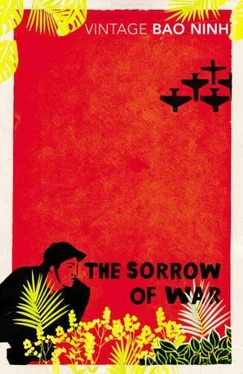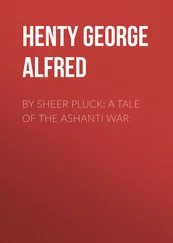‘By a strange quirk of fate, my husband’s was the last unit based here. After his group left no others came to Doi Mo. Now, after many years of peace you are the only one to return here. Just you. None of the others.’
She asked him to stay the night and he silently agreed. The short summer night softly enfolded them and all that was heard was the sound of a nightbird calling from the edge of the forest and the distant rippling of the hamlet’s slow stream.
Kien and Lan walked out together early in the morning; she stayed with him beyond the first hill, neither of them saying a word. The sun was warming them and the dew evaporated, rising around them. Lan’s face seemed pale and drawn.
‘A few years ago I decided to leave here,’ she said suddenly. ‘I intended to go south and rebuild my life. But I changed my mind. I just couldn’t leave my mother and my son lying over there. I just wait and wait, without knowing what I’m waiting for. Or for whom. Perhaps I’ve been waiting for you.’
Kien remained silent, avoiding her gaze.
‘I knew who you were straight away, although you look very different now. Back then I was so small. But I knew. Perhaps you were my first love and it took all this time for me to realise it.’
Kien tried to smile but his heart felt constricted. He gently raised Lan’s hand to his lips, bent his head, and kissed it a long time.
‘Stay. Live peacefully, my sweet. Try not to be sad, and try not to think poorly of me.’
Lan leaned forward, caressing his shoulders and his greying hair.
‘Forget me. Your life is an open road, go out and enjoy it. I’ll find a foster-child and we’ll live together peacefully. I wish I could have had your child, Kien, but it’s impossible. That doesn’t depress me. Just for a moment let’s imagine that we’ve both come back from the past, while our loved ones were still alive.
‘I ask you to remember one small favour for me. If you come to the end of your wandering and seem to have nowhere left to go and no one to turn to, remember you have a place here with me, always. A home, a woman, a friend. Doi Mo hamlet was where you started this war. You can make it your point of return, if you want to.’
Kien hugged Lan, pressing her to his chest. She said in a muffled voice, ‘Please go now. I’ll never forget you. Please, don’t forget me completely, my unexpected lover.’
He left, bending his head into the summer morning sun which spread across the grassy roadside. When he turned he saw his long shadow reaching back, pointing to Lan in the distance. She had not moved.
She had watched as he slowly walked away, and was still watching as he turned out of sight, over a distant hill.
Some years after that meeting, also on a summer afternoon, Kien and some journalist colleagues, riding a jeep back from the border, again passed through the same valley. The sight of the hills and streams, the smell of the earth brought to him on a pleasant wind, brought back powerful memories. Only he and the driver were still awake. Kien reminisced in silence, with a tinge of regret. It was here, this very place, where Lan had promised him a final refuge. ‘There is always one place and one woman here for you,’ she had said.
The sad, doomed meeting echoed back to him, reminding him of that final act of kindness.
Some of his loved ones he had not bothered to stay in contact with. Others had vanished. He had left yet others in his wake. He had lived selfishly these last years without looking back. Time and his work had taken over his life. He had sought neither opportunities nor responsibilities. The memory that afternoon reawakened in him the sense of sacred duty. He felt he must press on to fulfil his obligations, his duty as a writer.
It was necessary to write about the war, to touch readers’ hearts, to move them with words of love and sorrow, to bring to life the electric moments, to let them, in the reading and the telling, feel they were there, in the past, with the author.
Why choose war? Why must he write of the war? His life and that of so many others was so horrible it could hardly be called a life. How can one find artistic recognition in that kind of life? They gossip about me, the author who wishes to write of the war. They say of me that the war author cannot even bear to enter a cinema where people may be shooting each other on the screen.
Is this the author who avoids reading anything about any war, the Vietnam war or any other great wars? The one who is frightened by war stories? Yet who himself cannot stop writing war stories, stories of rifles firing, bombs dropping, enemies and comrades, wet and dry seasons in battle. In fact, the one who can’t write about anything else?
The author who will later have to give all credit for his unique writing style and story-telling fame to those war stories?
When starting this novel, the first in his life, he planned a post-war plot. He started by writing about the MIA Remains-Gathering team, those about-to-be-demobilised soldiers on the verge of returning to ordinary civilian life.
But relentlessly, his pen disobeyed him. Each page revived one story of death after another and gradually the stories swirled back deep into the primitive jungles of war, quietly re-stoking his horrible furnace of war memories.
He could have written about the macabre, or about cruel brutality without writing about the war. He could also have written about his childhood which was both painful and happy.
He could have written: ‘I was born and grew up… My late parents…’ and so on. And why not write of his father’s life and his generation? That was a generation both great and tragic, a generation bursting at the seams with ambitious Utopians, people of elegant spiritual and emotional qualities, sadly now long forgotten by Kien’s generation.
But when thinking of his childhood or his father, Kien becomes depressed. He feels that as a son he had not sufficiently loved or respected his father. He had not understood his father’s life and remembered almost nothing about his family tragedy. He still doesn’t know why his parents separated and knows even less about his mother. So it is strange that he remembers his mother’s second husband so clearly.
His mother’s second husband was a pre-war poet who had gone into hiding to escape the anti-intellectual atmosphere of the state ideologies that came with Communism.
Kien had visited him just once in an old house in the Hanoi suburb of Chem, on the edge of the Red River. There was a small window facing the northern dyke. Kien remembered the scene clearly. His real father had just died, five years after his mother, who had left him and remarried, to the poet, who became his stepfather. Kien decided he should visit his stepfather to say farewell before going away with the army. He was seventeen at the time and the visit left an indelible impression.
The house was old and greyish, surrounded by a sad, unkempt winter garden which itself was ringed by wispy eucalypts that rustled in the light breeze.
The entire scene reflected his stepfather’s extreme poverty. On a dusty family altar his mother’s photo rested in a frame with broken glass. The bed in the same room was limp and bedraggled. A writing table was a mess of books, papers and glasses. The atmosphere was depressing. Yet in sharp contrast his stepfather lived in a style which belied his conditions. His thinning white hair was neatly combed back, disguising some scars, his beard was well shaven and tidy, and his clothes were clean and pressed.
He treated Kien warmly and politely and with the correct intimacy for the occasion, making him hot tea and inviting him to smoke and generally feel at home.
Kien noticed that his eyes were blurred and his scraggy and frail old hands trembled.
Читать дальше












